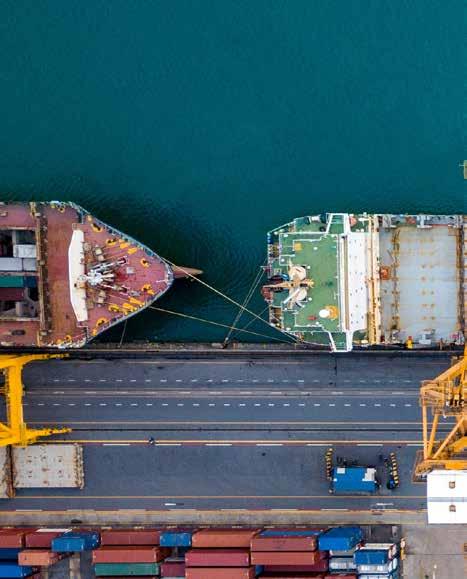
10 minute read
ENGINEERING SUPERHEROES: IFM ENGAGE HELPS AEROSPACE COMPANY SPREAD ITS WINGS
Yorkshire-based engineering company Produmax, global experts in flight-control components and assembly, won The Manufacturer’s MX Leadership & Strategy award in November 2022. They credit their collaborative journey with IfM Engage as crucial in helping them to succeed in a volatile global market and build resilience for the future.
Yorkshire-based engineering company Produmax, global experts in flightcontrol components and assembly, won The Manufacturer’s MX Leadership & Strategy award in November 2022. They credit their collaborative journey with IfM Engage as crucial in helping them to succeed in a volatile global market and build resilience for the future.
Advertisement
IfM Engage, the knowledge-transfer arm of the Institute for Manufacturing began working with Otley-based engineering company Produmax in 2014 as part of the Sharing in Growth (SiG) programme, which supports UK manufacturing & engineering companies to increase cost competitiveness, grow capability and sustainability.
With a £5 million turnover, Produmax was one of the smallest SiG beneficiaries at that time. But with plans to move the whole organisation to a new state-of-the-art factory in nearby Shipley, the company had high ambitions to grow, develop its capabilities and nurture its workforce.
In 2014, IfM Engage began working collaboratively with Sharing in Growth to develop Produmax’s strategy for doubling turnover to £10m by 2020.
Tools and approaches included:
• The ‘Prioritisation Diagnostic’ tool to understand strategic business priorities, identify a manageable number of objectives and get buyin from the management team to address objectives.
• ‘Strategy Development workshops’ to investigate and understand the internal and external environment for the company, explore a range of potential strategic options and then decide upon a future action plan. Following these workshops, Produmax’s senior leadership team was inspired to become “Engineering Superheroes” who would commit to engaging and inspiring their wider team so they could further develop their skills and contribute to growing the business.
• ‘Strategy Refresh’ workshops in 2017 to further develop the strategic landscape for the company. These workshops involved identifying and prioritising external drivers, marketfacing opportunities and developing an objective and transparent framework (Mapping Opportunity v Feasibility) to evaluate and build topic roadmaps for a portfolio of the company’s prioritised options. The opportunity versus feasibility framework and topic roadmapping were utilised again in 2018 and 2019 to further evaluate and build Produmax’s portfolio.
“Each individual engagement with IfM Engage was relatively short, with minimum disruption of the management’s day-to-day operations,” says Duncan Hurlstone (an Industrial Associate with IfM Engage who has worked closely with Produmax since the beginning).
“This is one of the key benefits of using our highly developed, collaborative approaches with companies. Time commitments are minimal, but the impact is long-lasting.”
By the end of 2019, the company was well on its way to achieving the targets it had set back in 2014. “Then, of course – COVID came along,” says
Duncan. “Although this kind of disaster scenario was considered as part of their resilience planning, Produmax – as with most of us – hadn’t actually expected it to happen in real life.”
Navigating a new landscape
The impact of the COVID-19 pandemic was devastating for the aviation and aerospace industry, with demand for new aircraft (including Boeing – a major Produmax client) almost coming to a complete standstill. The impact on Produmax was both immediate and profound:
“COVID was very difficult. We were exposed across all platforms, effectively victims of our earlier success. As a result, our turnover quickly fell –dropping back by over 60%,” says Mandy Ridyard, Financial Director of Produmax.
“The challenge became inverted (from building our capability to delivering our growing order book) to fully utilising our newly grown capability and capacity. At the same time, we were determined to play our part in helping the UK through COVID and maintaining staff morale as much as possible.”
Mandy credits the knowledge transfer, expert input and strategic tools and guidance provided by IfM Engage as being critical in helping them to get back on their feet:
“Our team revisited the strategy development and refresh work we had done together with Duncan and IfM Engage and used it to actively consider the new external context and critical drivers/challenges.
“We proactively targeted the space, energy, civil aerospace and defence sectors. This diversification allowed us to rebuild revenue and mitigate risk across a wider portfolio of products and customers.
“This refined strategy to build Produmax resilience has increased our customer base three-fold. We have also spread our market exposure to a balanced mix of platforms and sectors that align nicely with the evolving strategic criteria that we first developed and adopted in our work with IfM in our first strategy-refresh workshop back in 2017.”
Duncan says that developing the strategic landscape with IfM Engage helped Produmax to understand the “big picture”, as well as the real and present implications for their business:
“The ‘opportunity–feasibility–evaluation’ approach helped them to prioritise key opportunities and challenges that still aligned with their overall strategic ambition; and ‘topic roadmapping’ helped them to plan and implement what they decided to do to pursue this ambition.
“There are many people who talk about the need for organisations to be able to ‘pivot’ when required – well, Produmax did that brilliantly. They actively deployed and built upon their developed core capabilities to help them navigate these new challenges and adjust their direction through targeted diversification and so to grow again.”
“IfM Engage tools have become part of our DNA”
By the end of 2022, Produmax’s revenue had been rebuilt by nearly 90%, with a further 40% growth for this coming year projected. Today, the company exports 70% of its production to the USA, Canada, Japan, Morocco, the Philippines and Italy.
They have won multiple awards for their work (such as the SiG Award 2017, MAKE UK SME of the Year Award 2020 and Manufacturer of the Year Award 2022); and, most recently, in recognition of the company’s breadth and depth of leadership and management skills, as well as a clear, well-communicated business strategy, the company was awarded the Manufacturer’s MX Leadership & Strategy award last November.
“The results speak for themselves; turnover is up by almost 70% and an increase in people of almost 80%. In this time, we have opened a second factory, built a satellite facility focussed on Additive Manufacture at the Digital Manufacturing Centre at Silverstone and have recently won MAKE UK SME of the Year,” says Mandy.
“The tools and approaches we worked on with the IfM Engage and SiG team have become part of our Produmax DNA,” says Mandy, “enabling us to adapt our strategy to address critical challenges as they present themselves.
“We will continue to build upon what we have learned to equip ourselves for the new challenges and opportunities that undoubtedly lie ahead.”
Duncan reflects on the company’s engagement with IfM:
“Ever since day one, the team at Produmax have actively engaged with the approaches we have worked on together. Their insatiable thirst for proactively applying what has been learned, but also building upon this further, is truly inspiring. It also demonstrates how IfM Engage’s highly collaborative tools and approaches have a lasting positive impact, without the delivery sapping too much valuable time from the management team along the way.”
To discover more about IfM Engage, visit engage.ifm.eng.cam.ac.uk
Elizabeth Tofaris ejar2@cam.ac.uk
BEYOND COVID-19: WHAT CAN BE DONE TO ENHANCE THE RESILIENCE OF SMALLER MANUFACTURING FIRMS?

Micro-, small- and medium-sized enterprises (MSMEs) make up the backbone of national economies and are essential to many livelihoods. Globally, 9 in every 10 businesses are MSMEs, 6 in every 10 jobs are created by MSMEs, and half of the world’s gross domestic product is generated by them. Their contribution to the economy and their role in stimulating domestic demand means they are critical for post-COVID-19 recovery and future socio-economic resilience.
However, MSMEs face significant challenges that hinder their development and, in some cases, their survival. They face barriers accessing finance and attracting talent, as well as reaching markets and innovating. And because of these constraints on resources and capacity, MSMEs tend to be more vulnerable to crises and disasters.
Here, we look at what can be done to enhance the resilience of MSMEs, reflecting on the learning from our recent Cambridge Industrial Innovation Policy collaboration with the Association of Southeast Asian Nations (ASEAN): Enhancing the Resilience of MSMEs to Crises and Disasters: Regional Guidelines for ASEAN Governments.
In developing these Regional Guidelines, we reviewed a variety of initiatives in place by consulting more than 100 stakeholders across the 10 ASEAN Member States. This enabled us to develop a framework on how relevant agencies can support MSMEs to recover from the COVID-19 pandemic and be prepared for future crises and disasters.
Reflections from the ASEAN region
The Association of Southeast Asian Nations (ASEAN) region is one of the most hazard-prone in the world, accounting for 1 in every 10 disasters triggered by natural hazards during the past 120 years. Although this makes ASEAN MSMEs more exposed to disasters, it has also contributed to the development of public, private and social capacity to cope with natural and human-made hazards.
During the COVID-19 pandemic, MSMEs were disproportionally affected. In the ASEAN region, some of the main impacts that MSMEs faced included: interruption of operations, supply chain disruptions, demand contraction, a lack of liquidity and staff lay-offs.
The impacts, however, were unequal across population groups. For instance, women-led MSMEs were more likely than men-led MSMEs to temporarily close their businesses and to reduce their workforce. Women also faced greater losses in sales and revenue.
Challenges and opportunities
Although there are many initiatives supporting MSMEs in the ASEAN region, and these saw a substantial expansion during the COVID-19 pandemic, MSMEs tend to face multiple barriers accessing this support. This is particularly the case for smaller businesses and those that are not formally registered.
Common barriers faced by MSMEs include: a lack of clarity in application processes; slow application and approval processes; not being formally registered; a lack of collateral; and other difficulties meeting the eligibility criteria of programmes. Easing application processes and the eligibility criteria can help MSMEs to overcome these barriers, especially in times of crises.
We also identified a mismatch between MSMEs’ needs and the support available. Although exceptions were found, MSME support programmes tended to place less attention on measures to prevent risks and in preparing businesses to deal with hazards such as floods, droughts and infectious-disease outbreaks. Opportunities for policy development and coordination therefore include: business continuity planning and management; disaster risk prevention and management; and supplier development programmes.
Opportunities also exist for increasing collaboration between MSME development agencies, disaster risk-management organisations and business associations. Disaster riskmanagement organisations have relevant knowledge and experience in preventing and preparing populations for hazards; however, they tend to have limited links with MSMEs and MSME development agencies. Business associations can also play a key role in disseminating information on hazards and their impacts, as well as reaching out to MSMEs in crises and disasters.
What can be done to enhance the resilience of MSMEs?
In the Regional Guidelines we present more than 90 examples of policy measures across the 10 ASEAN Member States that can contribute to enhancing the resilience of MSMEs: from public risk insurance programmes and furlough schemes to programmes supporting the adoption of digital technologies, promoting gender-inclusive innovation, and financing green transformations.
Based on these case studies, the guidelines describe the typical actors and budgets involved in the design and delivery of policy measures, and lessons learned from the COVID-19 pandemic and previous crises, such as the devastation caused by multiple typhoons in the Philippines in 2008 and 2009 and floods in Thailand in 2011. Useful tools and resources for governments and enterprises are also part of the guidelines, including: policy toolkits, business continuity guides and digital readiness self-assessment tools. The Regional Guidelines are structured around the four phases of disaster risk management, as identified by the United Nations Office for Disaster Risk Reduction (UNDRR):
1. Prevention Prevention measures are aimed at reducing the vulnerability and exposure of MSMEs to hazards. An example of these measures is the Philippines’ Agricultural Insurance Program. It was designed to protect subsistence farmers and fisherfolk, covering seven insurance lines: rice crops, corn crops, high-value crops, livestock, fisheries, aquaculture and non-crop agricultural assets.
2. Preparedness
Preparedness measures are aimed at developing the knowledge and capacity among MSMEs and public actors to anticipate and respond in a timely way to the impacts of disasters and crises. The iPrepare Business facility is an example of a preparedness initiative. In Thailand, iPrepare Business partnered with Isuzu Motors Company to provide direct technical support on business continuity management to automotive suppliers in disasterrisk-prone areas. The technical support delivered to the Isuzu suppliers consisted of four in-house business-continuity managementtraining workshops.
Response measures involve actions taken directly before, during or immediately after a disaster in order to minimise its impacts. During the COVID-19 pandemic, digital technologies became a key enabler of business continuity. As a result, different governments launched and expanded support in this area. Community for Brunei is an example of these, a largescale digital platform launched in April 2020 by Bank Islam Brunei Darussalam to support small businesses and provide consumers with a safe way to continue their purchases.
4. Recovery
Recovery measures are aimed at restoring and improving MSMEs’ performance after a crisis or disaster. A resilient recovery involves not only restoring business performance to pre-crisis levels but also doing so while reducing future disaster risks and closing inequality gaps.
In the face of the climate crisis and the social and economic inequalities that COVID-19 exposed and deepened, policy measures aimed at supporting green transformations and the economic inclusion of women and other under-represented groups are essential for a resilient recovery.

For example, the Malaysian Green Technology and Climate Change Centre, through its Green Technology Financing Scheme, provides loans for developing or adopting green technologies and for improving energy efficiency or the use of renewable energy resources.
Another example is Cambodia’s Leading the Way for Gender Equality (LWGE) programme, which addresses gender inequalities. The LWGE programme involves policy development and monitoring for gender equality and gender mainstreaming; the promotion of women in public decision-making; the engagement of young people, media and educational institutions for gender equality; and the inclusion of disadvantaged groups of women and girls; among other goals and actions.
Next steps for building resilience
In moving forwards, it is important to take stock of the lessons learned from the COVID-19 pandemic and previous crises and disasters, to identify potential policy and governance gaps, and to evaluate the effectiveness of policy measures and communication channels. We therefore encourage policy-makers and other relevant actors to use the Regional Guidelines as a benchmark to assess current capacity and governance structures.
To be prepared for future crises and disasters, governments can develop national roadmaps setting a shared vision, establishing coordination mechanisms, and identifying publicand private-sector “champions” that could move policies forwards to enhance the resilience of MSMEs in the short, medium and long term.
Jennifer CastañedaNavarrete jc2190@cam.ac.uk








